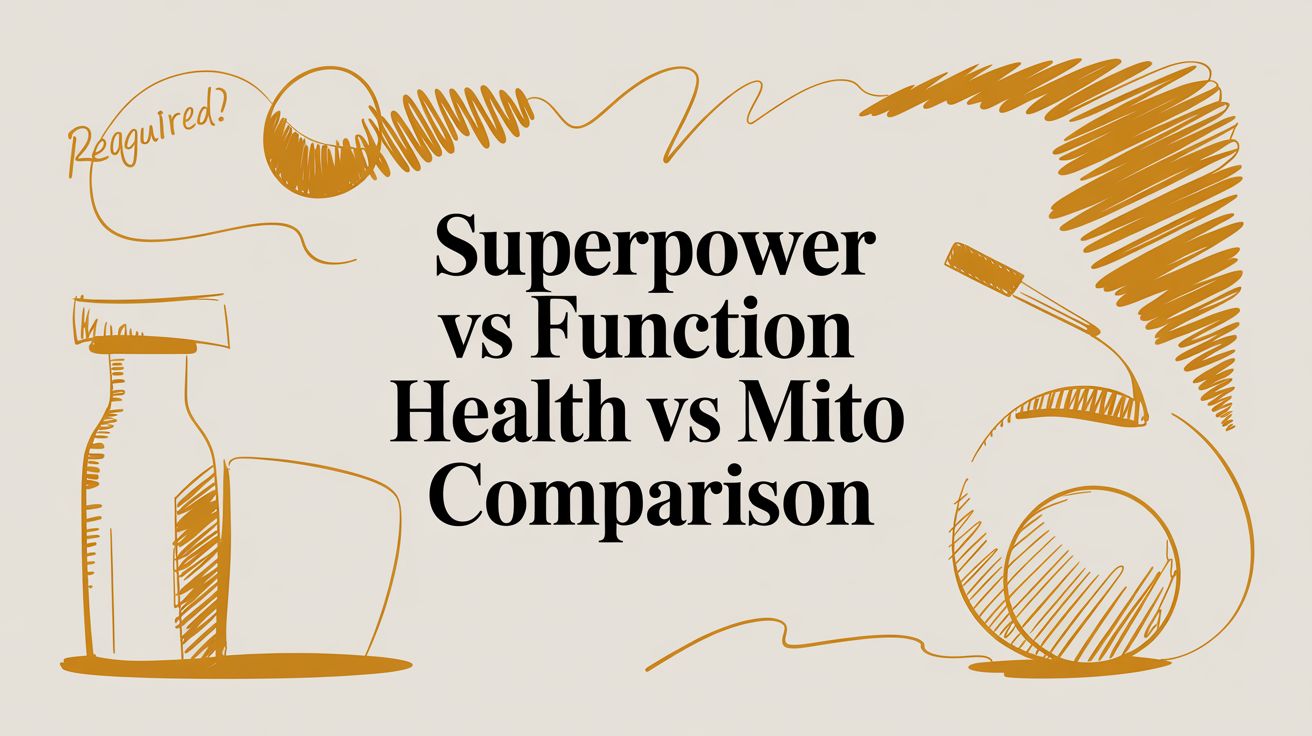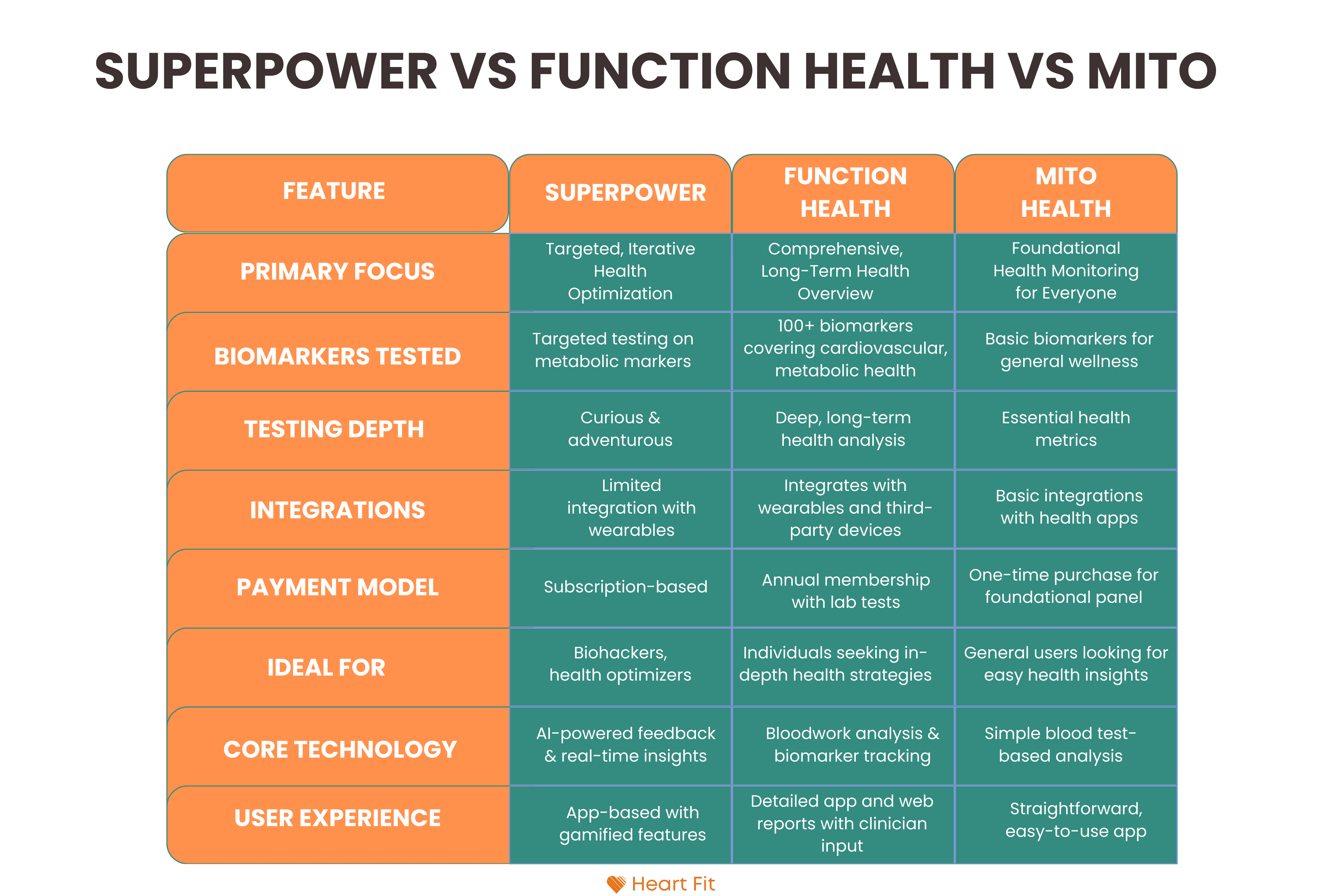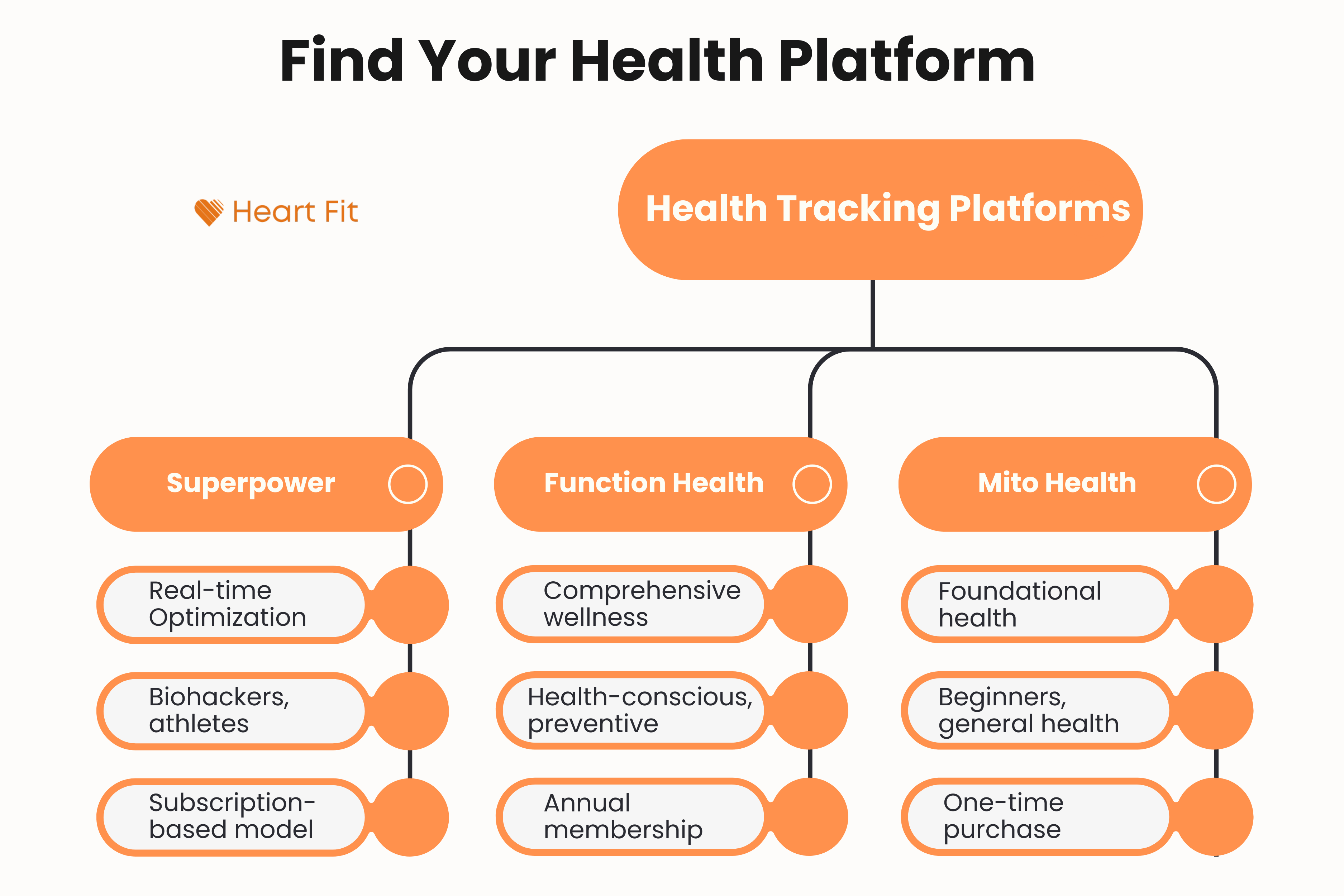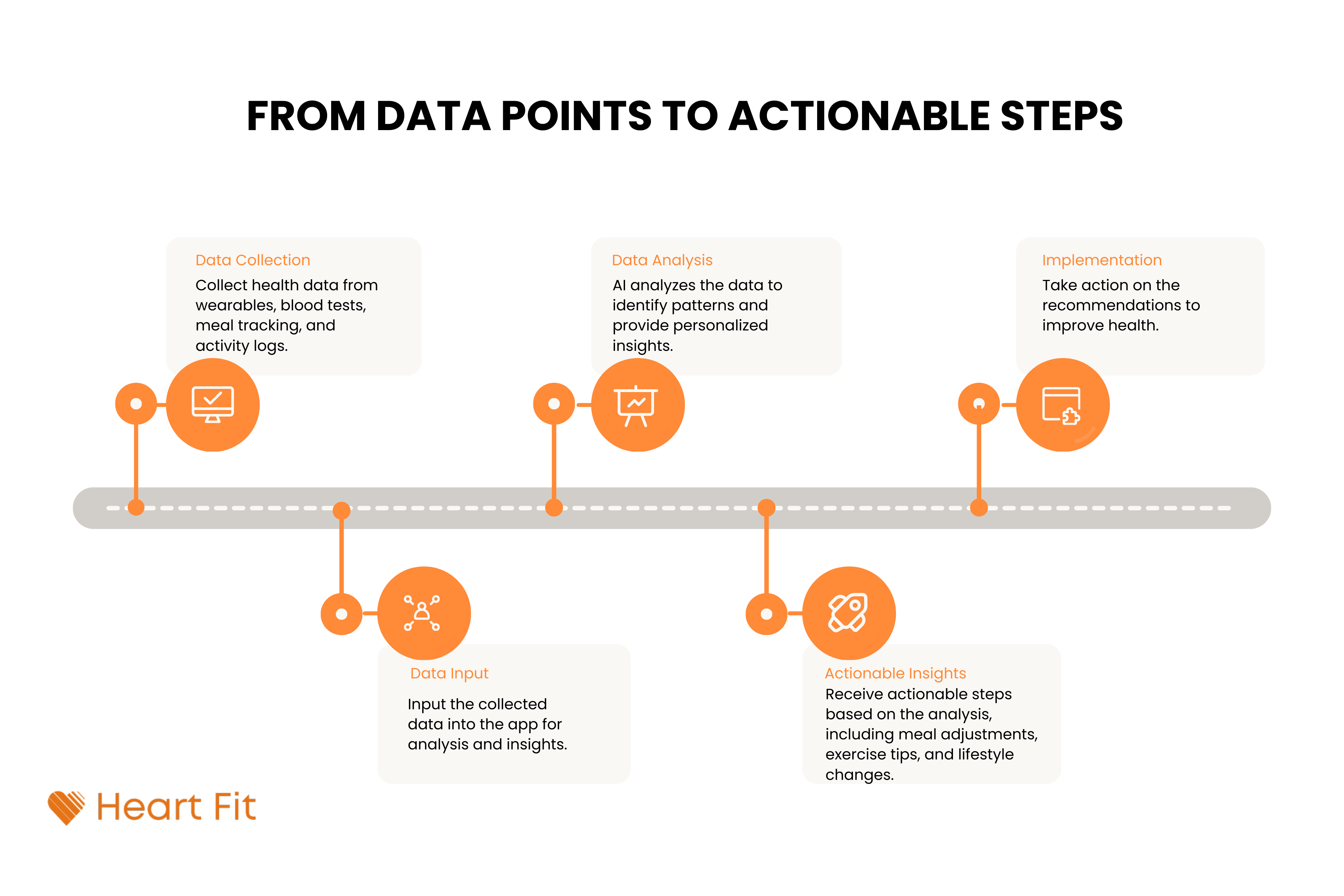A definitive Superpower vs Function Health vs Mito comparison. Explore biomarkers, user experience, and pricing to find the right health platform for you.

When you're looking at Superpower, Function Health, and Mito, the main difference really comes down to their core philosophy. Superpower is all about using AI for constant tweaking and optimization. Function Health gives you a massive, doctor-led diagnostic picture of your health. And Mito is your easy, one-time purchase to get foundational health insights without a big commitment.
Deciding which one is right for you depends entirely on what you're trying to achieve: ongoing AI-driven adjustments, a deep clinical snapshot, or just an affordable place to start.
Disclaimer: This article is for informational purposes only and is not a substitute for professional medical advice, diagnosis, or treatment. Always seek the advice of your physician or other qualified health provider with any questions you may have regarding a medical condition. It is recommended that you consult with a healthcare provider before making any significant lifestyle, diet, or medication changes.
Function Health’s homepage gets right to the point, emphasizing a deep, data-driven understanding of your health that goes way beyond a typical annual check-up. This isn't just a trend; it's a fundamental shift toward managing our health proactively, arming ourselves with detailed biological data.
We're seeing a real move away from reactive "sick-care" to proactive healthcare, and platforms like Superpower, Function Health, and Mito are at the forefront. Each one gives you a unique way to understand your body through biomarker analysis, but they’re built for different people with different goals.
Take Function Health, for instance. Their entire model is built around a comprehensive, doctor-led experience. A membership gets you over 100 tests intended to paint a complete picture of your health, which is then reviewed by clinicians who map out a personalized action plan. This is a solid choice for anyone wanting a thorough, medically guided baseline to work from.
On the other hand, you have platforms like Superpower that are all about using technology for continuous health management. As a newer player, Superpower really showcases how tech can reshape personalized supplementation through its AI-driven analytics and access to concierge health teams for actionable advice. You can get more details on Superpower's approach over at Nutraingredients.
Then there's Mito Health, which offers an accessible, one-time purchase. This makes it a fantastic starting point for people who are new to biomarker testing and want solid insights without locking into a subscription.
To really make the right call, you have to put them side-by-side. The best platform is the one that aligns with your personal goals, whether that's fine-tuning performance, establishing a health baseline, or simply getting started. And while these services deliver the data, the next step is integrating it into your daily life. The best health tracking apps can help turn insights into action.
To give you a quick snapshot, here's a high-level look at how these three services stack up against each other. This should help you see at a glance which one might be the best fit for your needs.

Feature Superpower Function Health Mito Core Value AI-driven continuous optimization and supplement recommendations.Comprehensive, doctor-led diagnostic baseline with 100+ biomarkers.Accessible, single-purchase entry point for foundational insights.Target User: The data-driven individual focused on continuous performance tuning. The health-conscious person seeking a deep, clinical health snapshot.The curious beginner looking for an affordable introduction to biomarker testing. Pricing Model: Annual Subsription, Annual Membership (includes two tests per year), One-Time Purchase
Ultimately, each platform serves a distinct purpose. Superpower is for the optimizer, Function Health is for the deep diver, and Mito is for the curious newcomer.
For decades, healthcare has been a waiting game. You wait for symptoms to show up, then you go to the doctor to get treated. The annual physical was our one checkpoint, a quick glance under the hood that often missed the bigger picture. This old-school, reactive model just doesn't cut it anymore because it fails to spot the subtle biological clues that pop up long before a chronic disease takes hold.
We're in the middle of a huge shift. People are tired of being passive passengers in their own health journeys. Armed with more data and a desire for a longer, healthier life, they're taking the wheel. This isn't just about dodging sickness; it's about optimizing everything-from how you feel each morning to your cognitive sharpness well into old age.
The limits of the standard annual check-up are glaringly obvious now. A basic lipid panel might give you a total cholesterol number, but it often skips crucial details like your ApoB level. ApoB, or Apolipoprotein B, is a protein that helps carry fats-including LDL cholesterol, the "bad" kind, through your bloodstream. According to a 2023 scientific statement from the American Heart Association, measuring ApoB can provide a more accurate assessment of cardiovascular risk than LDL cholesterol alone.
This is exactly where services like Superpower, Function Health, and Mito come in. They're cracking open the door to comprehensive biomarker data that, until recently, was only accessible in clinical trials or through specialized doctors. By offering panels that cover dozens or even hundreds of markers, they're handing you the tools to see what's really going on inside your body.
This move toward consumer-driven health is fueling a massive wellness market. People are investing heavily in their long-term health, and the surging demand for supplements and preventative care proves it. It's more than an economic trend; it’s a cultural shift toward using data for self-care and prevention.
The numbers are pretty staggering. The global wellness supplements market was valued at USD 291 billion in 2025 and is expected to blow past USD 568.75 billion by 2034. North America is leading the pack with a 45% market share, largely because people here are so tuned into their health. You can dig into these wellness market trends to see just how big this movement has become.
This desire to be proactive is exactly why a "Superpower vs Function Health vs Mito comparison" is so important right now. These companies aren't just selling blood tests. They're offering a completely new way to manage your health—one based on continuous data and personalized, actionable steps. Understanding this shift is the key to figuring out which platform can best help you reach your own health goals.
The real value of any health testing service comes down to the quality and relevance of the biomarkers it measures. Just counting the number of tests doesn't tell the whole story. A closer look reveals some pretty big philosophical differences between Superpower, Function Health, and Mito—each one curates its panel for a very specific job, from giving a wide diagnostic snapshot to feeding targeted, AI-driven health plans.
This push for proactive health is catching on, and the market growth reflects it. The whole proactive health and wellness sector is on track to nearly double in the next ten years. That's a clear signal that people are hungry for detailed biological data to steer their lifestyle choices.
This trend is powerful. It highlights a massive shift away from just treating symptoms after they appear to actively managing health, with deep biomarker analysis right at the center of it all.
When it comes to being thorough, Function Health sets the bar. They offer a panel with over 100 biomarkers built to give you a deep, clinical snapshot of where your health stands right now. Their approach is intentionally broad, covering everything from the usual lipids to advanced inflammatory markers, hormones, and nutrient levels.
An extensive panel like this is useful for getting a detailed baseline. For instance, on the cardiovascular front, they don't stop at standard cholesterol. They include Apolipoprotein B (ApoB), which is now considered a more accurate predictor of heart disease risk than LDL-C alone, a view supported by a 2023 meta-analysis published by the National Institutes of Health (NIH).
By casting such a wide net, Function Health aims to spot subtle issues that a normal check-up would likely miss, giving their clinicians a rich dataset to work with.
Mito Health also comes in with a panel of over 100+ biomarkers, but they frame it as a more accessible starting point for comprehensive testing. Their panel gives you a solid foundation, hitting key areas like cardiovascular health, metabolic function, and essential vitamin levels.
Their core tests include critical heart health indicators like high-sensitivity C-reactive protein (hs-CRP). This is a key inflammation marker that the Centers for Disease Control and Prevention (CDC) indicates can help assess cardiovascular risk. While the panel is extensive, the experience feels geared toward delivering clear, actionable insights, especially for those new to this level of analysis. For a more detailed breakdown, check out our Function Health vs. Mito Health review.
In short, the biggest difference isn't just the number of markers tested. It's about the clinical context and what you're supposed to do with the information. A service with 100+ tests but vague guidance is far less useful than one with 50 well-explained markers tied to a concrete plan.
Superpower plays a different game. While they also offer a big panel, their biomarker selection is specifically chosen to power their AI recommendation engine for supplements and lifestyle tweaks. The focus is squarely on actionable data you can track over time to see if the changes you're making are actually working.
Their goal is less about a single, comprehensive diagnostic and more about creating a continuous feedback loop. They measure what the AI needs to guide you, encourage re-testing, and then refine their recommendations. It’s a dynamic process for anyone serious about optimization.
Let's get practical and compare how each service stacks up on key cardiovascular health markers. The table below breaks down their coverage, showing that while they all hit the essentials, the surrounding data they collect varies.

Biomarker Category Key Markers Superpower Coverage Function Health Coverage Mito Coverage Lipid Panel Total Cholesterol, HDL, LDL, Triglycerides, ApoB Yes (includes ApoB) Yes (includes ApoB) Yes (includes ApoB) Inflammation High-Sensitivity C-Reactive Protein (hs-CRP), Fibrinogen Yes (includes hs-CRP)Yes (includes hs-CRP)Yes (includes hs-CRP) Metabolic Health Glucose, Hemoglobin A1c (HbA1c), Insulin Yes (includes HbA1c)Yes (includes HbA1c) Yes (includes HbA1c)
All three platforms offer strong, modern panels that go way beyond the basics, including must-haves like ApoB and hs-CRP. The main differentiator is the sheer breadth of other markers tested alongside these core ones. Function Health casts the widest net for a truly holistic view. Superpower and Mito, on the other hand, provide robust but more focused panels designed to support their specific models of care and optimization.
Raw lab numbers, no matter how detailed, are pretty useless unless you can understand what they mean and actually do something with them. A smooth journey—from the moment you order a test to the day you start seeing real changes—is what makes a health service truly valuable. This is where the differences between Superpower, Function Health, and Mito really start to show.
Each service has its own philosophy for presenting complicated health information. Superpower uses an AI-powered interface for daily check-ins, Function Health provides incredibly detailed, doctor-reviewed reports, and Mito goes for a clean, easy-to-understand presentation. How they deliver these insights directly shapes how much you'll get out of the data.
Your dashboard is where you'll spend most of your time, and each one is built to reflect the company's core mission.
Getting your results is one thing; knowing what to do next is everything. This is a huge differentiator.
Function Health gives you a detailed "Action Plan" written by a clinician. It breaks down your key findings, explains why certain markers are off, and offers specific suggestions for lifestyle, diet, and supplements. Just be prepared to wait—some users report their comprehensive notes took about a month to arrive.

Superpower’s advice is constant and AI-driven. The platform spits out supplement and lifestyle ideas based on your results, giving you an almost immediate feedback loop. This is a good fit if you’re the type who likes to make small, consistent changes and watch the impact closely.
Mito Health bridges the gap by pairing its digital report with a personal consultation. This lets you ask direct questions and build a plan with a professional, making sure the recommendations fit your real life. That personal connection can be exactly what you need to turn insights into action.
In short, a service's real value isn't just in the data it collects, but in how well it helps you connect the dots between information and implementation. The right platform for you will be the one whose guidance style—whether it's clinical, AI-driven, or personal—actually motivates you to stick with it.
If you’re serious about managing your health, you need to own your data. The ability to export your raw numbers lets you track trends over the long haul, share them with your doctor, or plug them into other specialized apps.
Most of these services, including Function Health and Mito, let you download your results, usually as a PDF or sometimes a CSV file. This is absolutely critical if you're trying to build your own unified health dashboard with different tools.
This is where plugging your data into a dedicated habit-tracking app becomes so powerful. For instance, you can take the detailed recommendations from a Function Health report and use a tool like HeartFit to break them down into daily, manageable habits. Uploading your raw data or even just manually entering key biomarkers creates a system that keeps you accountable. Platforms with easy data export options are always going to be more valuable for anyone building a personalized health stack. To see how this works, you can explore the features of the HeartFit app and see how it turns clinical advice into a sustainable lifestyle.
You have to look past the sticker price to understand what you're really paying for with these health testing services. The way Superpower, Function Health, and Mito structure their costs says a lot about their core philosophies, and each one is built for different budgets and goals. When you put them side-by-side, it's clear that what you pay for—and how you pay—shapes the entire experience.
People are definitely getting more serious about proactive health. The global health supplements market was valued at around USD 177.95 billion in 2025 and is expected to hit USD 315.59 billion by 2033. This explosion shows people are willing to invest in staying healthy, which makes it even more important to understand the true value of these testing services. You can dig into the drivers behind this trend in the full health supplements market report on SNS Insider.
Mito keeps things simple: you pay a flat fee one time. For that price, you get their big 100+ biomarker panel, a review from a clinician, and a personal consultation to go over the results. This is perfect for anyone who's new to this kind of testing and just wants a comprehensive health snapshot without getting locked into a subscription.
The biggest plus here is the transparency. There are no hidden or recurring fees, making it a low-risk way to get started. The price covers the test kit, the blood draw at a partner lab, and the follow-up call, which is a ton of value packed into a single payment.
Mito's own website breaks it down nicely, showing how their one-time price and included features, like a longevity advisor consultation, stack up against competitors.
This positions Mito as a feature-rich, accessible choice for anyone who wants a deep dive into their health without an ongoing financial commitment.
Function Health is built around an annual membership. Your yearly fee gets you two comprehensive blood tests—one baseline test with 100+ markers and another one a few months later to see what's changed. This is really designed for people who are serious about tracking their progress over a full year with a doctor's guidance.
The value is in the structured, year-long journey. You aren't just buying a lab test; you're investing in a program. It gives you a clear framework for seeing if your diet and lifestyle changes are actually working. The upfront cost is more than Mito's single test, but you get two sets of data and continuous access to your dashboard and clinician's notes.
Superpower's model is a subscription focused on continuous, AI-powered health tuning. The annual fee unlocks their platform, AI analysis, and supplement recommendations, but the blood tests themselves are often an extra cost. This approach is tailor-made for the dedicated biohacker or data geek who wants to test frequently and get a constant stream of feedback.
The long-term value with Superpower comes from its dynamic nature. It’s less about a single snapshot and more about an ongoing partnership with an AI to fine-tune your health. This only really makes sense if your goal is iterative improvement and you plan on re-testing several times a year to see if your strategies are paying off. Just be aware that the total annual cost can climb quickly once you add multiple test purchases to the subscription fee.
Picking the right health testing platform really comes down to what you're trying to achieve. After putting Superpower, Function Health, and Mito head-to-head, it’s obvious they’re built for different people with different goals. The best choice isn't just about who has the longest list of biomarkers; it's about finding the service that clicks with your health philosophy, budget, and how deep you want to go.
The key is to match your own needs with what each platform does best. Are you aiming for continuous, data-backed optimization? Or do you need a comprehensive clinical baseline to see where you stand? Maybe you're just looking for an easy way to dip your toes into biomarker testing. Answering that question will point you in the right direction.
If you live by the mantra "test, tweak, repeat," then Superpower is your clear winner. It’s built for the person who loves digging into data and making constant adjustments to their routine. The subscription model is designed to create a continuous feedback loop between your lifestyle and your biology.
Think of Superpower less as a one-off diagnostic and more as an ongoing partnership with AI to fine-tune your health. If you get a kick out of seeing incremental biomarker changes and want an algorithm to guide your supplement and diet strategy, Superpower’s dynamic approach is tailor-made for you.
If you're after a deep, medically-grounded understanding of your current health status, Function Health is the way to go. Its annual membership, which gives you two comprehensive tests covering over 100 biomarkers, provides an incredible diagnostic baseline. The real magic is in the detailed reports, written by clinicians, that actually connect the dots between all your results.
This service is a good fit if you want to establish a thorough health snapshot, track your progress over a year, and get guidance rooted in solid clinical expertise. Function Health gives you a ton of data to have much more informed, productive conversations with your own doctor.
Just starting your journey into biomarker testing? Mito is the perfect entry point. It offers a comprehensive panel with 100+ biomarkers without locking you into a subscription. The one-time purchase model lowers the barrier to entry, and you still get a one-on-one consultation with a licensed clinician to walk you through your results. That mix of deep data and personal guidance is invaluable when you're just starting out.
Mito offers a fantastic, low-risk way to get your feet wet. You get a rich dataset and the professional context to make sense of it all, making it an excellent first step toward proactive health without a long-term financial commitment.
Ultimately, no matter which service you pick, getting your results is just the beginning. The real work is turning those insights into habits that stick. For that, we recommend a solid tracking app.
Best Health Tracking Apps:
Diving into at-home health testing can feel a bit overwhelming, and it's natural for questions to pop up. Let's tackle some of the most common ones when comparing services like Superpower, Function Health, and Mito.
Generally, no. Direct-to-consumer services like Function Health and Mito operate outside the traditional insurance system. This is often part of their value, as they provide access to a broader range of biomarkers that a standard insurance plan might not cover for preventive screening.
However, you may be able to use funds from a Health Savings Account (HSA) or Flexible Spending Account (FSA). It's always best to check with your specific plan administrator to confirm eligibility. Before ordering any tests, you should consult with your doctor.
This depends on your individual health goals and medical history. If you are actively working with a healthcare provider to manage specific conditions or improve markers—like lowering your LDL cholesterol (the "bad" kind) or HbA1c (a measure of long-term blood sugar control)—re-testing every 3-6 months can provide useful feedback. This timeframe generally allows lifestyle changes to be reflected in your results.
For general health monitoring, an annual comprehensive panel is often sufficient. According to the American Heart Association, adults should have their cholesterol checked regularly. The optimal frequency depends on age and risk factors, so it's important to establish a testing schedule with your doctor that's right for you.
All three services provide excellent coverage of key cardiovascular markers, including modern essentials like ApoB and hs-CRP.
Remember, collecting the data is only step one. The crucial next step is implementing and sustaining lifestyle changes. This is where a dedicated tracking app can be invaluable.
Heart-Healthy Habit Apps:
When you pair one of these comprehensive lab tests with a smart tracking app, you’ve built a powerful system for truly owning your cardiovascular health.
Ready to turn your health data into lasting habits? HeartFit transforms your action plan into a simple, motivating daily system. Start your free trial and build a healthier heart, one habit at a time.